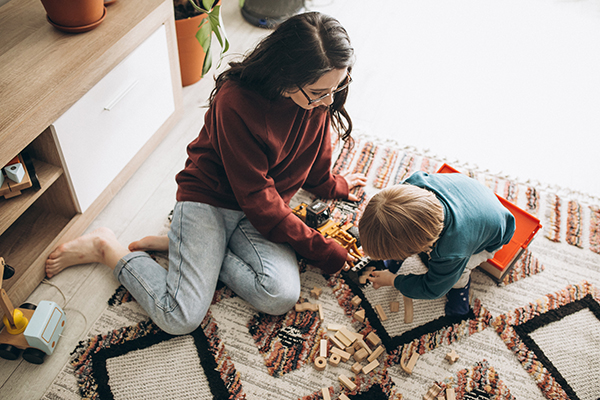
As a parent to a child with autism, finding a babysitter and leaving your child in their care can be a daunting experience. While it’s normal to feel this way, it’s important to keep in mind that there are babysitters who are specialists in working with children with autism. Knowing what to look for and where to find one can go a long way towards identifying the perfect babysitter for your child and your own peace of mind.
In this article, we’ll discuss everything you need to know about finding the right babysitter for your child with autism.
What to look for in a babysitter for your child with autism
There are a few traits that make great babysitters for children with autism. Keeping in mind these traits in the selection process can help you choose the right sitter.
Patience - Caring for a child with autism can be overwhelming at times – from tantrums and aggression to unexpected messes. Children with autism can also be sensitive to bright lights, loud noises, and even have emotional outbursts. A great babysitter should always be patient when dealing with these situations. If the sitter gets angry or shows signs of agitation, they probably aren’t a good fit for babysitting your child.
Calmness - Anything can happen when you’re away, and it’s important for your child’s babysitter to maintain calmness in the face of unexpected situations. For example, if your child is injured, you want the babysitter to remain calm in order to properly deal with the emergency. Your ideal babysitter should also be able to calmly explain to your child why they can’t do something, such as going outside when it’s cold or playing with something that may injure them.
Empathy - A great babysitter should also be able to connect with your child and understand their needs. Before leaving them alone with your child, ask your potential babysitter to come to your home and spend some time with your child while you are there. Take some time to watch how the sitter and your child get along together. Afterwards, ask your child how they relate with the sitter, what they talked about, what activities they did, and if they like them. It can be good to have similar conversations with your child’s babysitter to see how they empathize with your child.
Where to find a great babysitter for your child with autism
Below are a few strategies for how to find a babysitter for your child. While these apply to finding babysitters for all children, there are some tips below to use these strategies specifically for finding a great sitter for your child with autism.
Ask for referrals
One great strategy is to ask for referrals from other parents. If you have a local ASD support group or church you attend regularly, try asking some of the members about their preferred babysitters. Other parents of children with autism may already have babysitters that work well for their children and could work for yours, too. Personal references from people you know who are familiar with your child, such as family and friends, can also be a great way to find a babysitter. In fact, friends and family members could turn out to be great sitters for your child, especially if they already know your child, spend time with them frequently, and interact with your child well.
Your child’s school
Most schools that enroll children with autism have school aides. If this is the case for your child’s school and your child has bonded with one of the aides, ask them about the possibility of babysitting for your child. The aide may be happy to work a few more hours after school, and their prior experience working with your child could make them a perfect babysitter for your child. However, not all aides are able to take on additional work hours outside of their primary jobs. If this is the case with your child’s school aides, ask if they have colleagues or friends with similar training who they can suggest you contact. Even if your child’s school aide doesn’t end up being a babysitter for your family, knowing your child means they can be a great resource for finding a sitter.
Reach out to colleges in your area
Local colleges, universities, and community colleges can also be great places to find the right sitter for your child with autism. You may find students enrolled in special education degree programs who would love to babysit your child to gain some experience and make extra money. Contact the college or university and let them know you would like to offer a part-time job to their students, and that it would be working with a child with autism. They will advise you on the right way to post the job or offer recommendations.
Search on the internet
If you’re in urgent need of a babysitter, and/or your family members or friends are not available to help, you can always refer to a few highly-rated websites offering babysitting services for children with autism, like Care.com, for example. Alternatively, many communities have local babysitter groups on Facebook that allow you to post requests for babysitters with specific experiences or backgrounds, such as working with children with ASD. Especially when bringing on a babysitter you don’t have a personal reference for, your own evaluation of a potential sitter is crucial. Before leaving your child with any potential babysitter, let them spend some time together while you are present just to see how they interact with each other.
What knowledge should a babysitter for a child with autism have?
One of the biggest challenges your babysitter is likely to encounter when looking after your child is ASD-specific self-regulation, which refers to a lack of emotional regulation. Children with autism may not react to stimuli in the same ways that neurotypical children might react. Your child’s babysitter should be prepared to learn about how your child navigates the world and reacts to different stimuli, and work with them accordingly.
A babysitter also needs to understand the routine of your child with autism, and generally they must understand the importance of routine for children with autism. Children with autism thrive with routines and in situations where they know what to expect. When their routines are changed, they can become stressed and anxious. So, inform your babysitter about your child’s pre-set routines and be sure to answer any questions they have before you leave them alone together. It can also be helpful to make sure your sitter knows how to integrate changes into your child’s routines, just in case they need to do so.
Preparing for your babysitter
Once you’ve picked your preferred babysitter, the next step is to prepare so that everything runs smoothly when you leave.
Here are a few tips to keep in mind:
- Introduce them to your child in advance - To ensure your child feels comfortable, introduce them to the sitter at your home before they are left alone together. This may be done days before you’ll be gone, or the day of. Communicate with your child about what they can expect while you’re away.
- Explain your child’s needs to the sitter - You may have hired a babysitter that knows how to handle children with autism, but note that they are dealing with your child on their own for the first time. Remember to bring them up to speed with your child’s specific needs. It may be useful to write these down.
- Provide contact information - Before leaving, provide the sitter with contact information such as your phone number, where you’re going, and the contact details of your child’s doctor and care team. You can also write down the contact details of a close family member or friend if the babysitter is unable to reach you in an emergency.
- Check-in with your sitter about their needs - While it’s important to make sure your child is comfortable with your new sitter, it’s also important to ensure your babysitter is comfortable while they are babysitting your child in your home. Find out if they’ll bring their own food or not. If you’ll be gone a long time, ensure they have a comfortable place to sleep, if they need to. Ask if they’re expecting any calls or other disruptions that might interrupt your child’s typical routine.
Final Thoughts
Finding the right babysitter for your child with autism can be challenging, but with patience, perseverance, and a thoughtful approach you can find one that will support your child while you’re gone, and let you be worry-free while away from your child.

